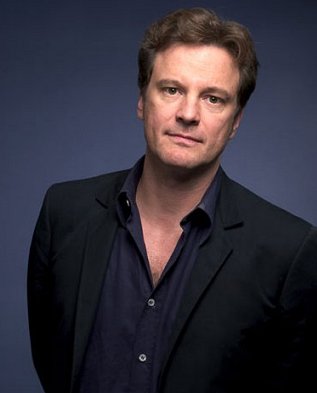In fact, he begged. He would've done it for free. But you didn't want him. "I don't remember the names of the companies," Firth says, his refined accent putting one in the mind of cobblestone streets and imposing English manors. "I tried at least one on Granville Island, quite aggressively, I remember. I even went 'round to talk to someone in the administration there and it was very much a closed door. "It's much, much easier getting into Hollywood than to get into the Vancouver theatre system," he adds with a laugh. The 43-year old actor is in Toronto to promote Girl with a Pearl Earring, a period piece which invents a life story for one of art history's most mysterious figures, 17th-century Dutch master Johannes Vermeer. A tall, solid man, Firth relaxes back on a hotel room couch, looking quite comfortable in a worn jeans and a loose-fitting blue dress shirt. At first he's a bit hesitant to talk about those five years, more than a decade ago, when he commuted back and forth from London to a cabin near Maple Ridge, British Columbia. Perhaps he's worried he'll be asked about what brought him there—a relationship with his Valmont co-star B.C. native Meg Tilly, which produced son Will, and then ended. But when Firth realizes his impression of the Great White North are all that's being sought he becomes warmer, more animated and nostalgic. "It was wonderful," he says of the rustic home he shared with Tilly and the baby. "It was in thick woods on the side of a mountain and it felt like there might be no one for miles and miles." He remembers one journalist sent from an L.A. magazine to interview Tilly, who admitted he expected to find her living in a pseudo-authentic retreat. "He couldn't believe quite how wild it was," says Firth. "I'm not trying to suggest it was wild in a sort of barbarian way, but it wasn't like North Van, where there are a lot of retired Hollywood producers and that stuff." It was about that time that Firth thought it would be nice to get involved with a local theatre company. He was getting tired of flying back and forth to London where he was still making movies and appearing in esteemed stage productions, like a revival of Harold Pinter's The Caretaker which was directed by Pinter himself. "I would come back [to B.C.] thinking I'd had a very rewarding experience, and I just thought maybe there's a small theatre company in Vancouver that might benefit from an outsider who has experience with a writer of the stature of Pinter. Unfortunately, I didn't get a single reply from anybody," he says, elongating the "in" in "single" for emphasis. A couple of years ago, Firth—who is now married to Italian documentary filmmaker Livia Giuggioli, with whom he has two young boys—returned to Vancouver to shoot Hope Springs. The romantic comedy, which co-starred Heather Graham and Minnie Driver, ended up going straight to video, but at least the shoot allowed Firth to see some old friends from his B.C. days. "It felt really good," he says. "You never know quite how it's going to feel to go back to a place until you do, but it was a very good feeling. I'm very fond of that part of the world."
The film is based on the Tracy Chevalier bestseller in which the writer imagines Vermeer enticing a young servant girl, Griet (played by Lost in Translation's Scarlett Johansson), to sit for the portrait. The pair develop a borderline romantic relationship that involves secret breaks from Griet's housework to help mix Vermeer's paints. Since history recorded virtually nothing about Vermeer's personality or physical appearance, Chevalier was able to concoct his entire character. The Vermeer she created is a quiet, somber, but gentle figure who uses his small attic studio as a refuge from the overbearing wife, dominant mother-in-law and gaggle of offspring who live downstairs. As Firth points out, for all we know the real Vermeer could have been a short, fat, jolly joker. But the actor appreciates the quieter path Chevalier chose. "I think what she did cleverly, and very imaginatively, is she responded to the mystery that you feel when you look at the painting," offers Firth, "and rather than doing anything controversial with that, or jarring, which might have been fun, I think she went with the sensations that those portraits give you. What you've got is something that when you first look at them feels still and tranquil and serene." Shortly after this interview Firth set off to London to shoot the Bridget Jones sequel, The Edge of Reason. The first movie, Bridget Jones's Diary, allowed Firth to spoof the character for which he's most famous— the uptight, but ultimately noble Mr. Darcy from the BBC version of Jane Austen's Pride and Prejudice. Helen Fielding, who wrote the books which inspired the films, mimicked the Pride and Prejudice story arc, with Bridget falling for a guy who resembled Firth's rendition of Mr. Darcy, and who was coincidentally named Mark Darcy. The tangled cross-referencing and meta-drama of actually casting Firth in the role delighted Pride and Prejudice's many ardent fans. And, although there was much speculation and online gossip about whether the three principals from the first Bridget Jones's Diary (Firth, Renée Zelwegger and Hugh Grant) would return for the sequel, Firth now admits their cinematic reunion was inevitable. "It had momentum," he says. "There was a point when it could have been stopped by one of us saying, 'No. Not for me. Not ready. Not available.' But this thing has existed as bigger than a script...it's a whole event and a whole concept, and it feels, I don't know, there may be seven of these for all I know. It may become a franchise like Bond." And to think, had things gone a little bit differently, Firth could have been swept away by the Canadian stage a decade ago, never to fulfill his double Darcy destiny. |

 Vancouver
theatre folk can lament lost opportunity this month as they watch Firth
do his famous on-screen smoulder in Girl with a Peal Earring, a
quiet, artfully shot reflection on what might have inspired Vermeer to
paint that famous, haunting portrait of a wide-eyed anonymous lass.
Vancouver
theatre folk can lament lost opportunity this month as they watch Firth
do his famous on-screen smoulder in Girl with a Peal Earring, a
quiet, artfully shot reflection on what might have inspired Vermeer to
paint that famous, haunting portrait of a wide-eyed anonymous lass.